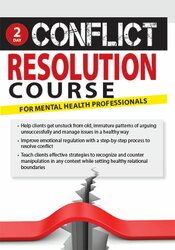

Clients walk into your office every day with different complaints and yet there is a commonality that is easily missed – the context in which their struggles often develop is conflict – poorly-handled, unresolved conflict.
Conflict is unavoidable, whether it’s in a marriage, family, work, or friendship context though it’s not always obvious that poor conflict management skills are at the heart of client’s problems. Their lack of conflict management skills can lead to struggles with depression, anxiety, and a host of other issues that bring them to your office. These problems become even more significant if the client has a conflict with an emotional manipulator who has neither the ability nor desire to resolve problems.
Many mental health clinicians are not skilled at conflict resolution and it is an area often neglected in many training programs. Alternative Dispute Resolution expert, Dr. Alan Godwin, combines decades of clinical practice and the latest behavioural research to offer you comprehensive solutions and an easy-to-understand conflict resolution system you will be ready to use the next day to engage and empower your clients.
Don’t miss out on this unique chance to expand your clinical skill set, your clients are counting on you.
| File type | File name | Number of pages | |
|---|---|---|---|
| Manual - 2-Day Conflict Resolution Course for Mental Health Professionals (3 MB) | 143 Pages | Available after Purchase |

Alan Godwin, Psy.D., is a licensed psychologist in private practice with over 30 years of experience. Dr. Godwin has expertise in working with personality disordered clients and with clients who’ve been negatively impacted in close relationships with disordered people. Certified in Alternative Dispute Resolution, he has dedicated himself to helping individuals, couples, churches, and businesses develop better ways of handling conflict. In addition to his private practice, Dr. Godwin serves on the adjunct faculty of the Graduate Counseling Department of Trevecca University in Nashville, TN, where he teaches doctoral students and has also taught undergraduate students.
Additionally, he has penned a regular quarterly feature entitled “Ask Dr. Alan” for Deacon magazine, writes a weekly email called “The Drama Review: In Relationships and Culture,” and has been a guest on numerous radio and television programs across the U.S. and Canada. Dr. Godwin’s book, How to Solve Your People Problems: Dealing with Your Difficult Relationships, explains how and why conflict goes badly and how to make it go well with two types of people: those who are normally-wired and those who are personality disordered. For more information about Dr. Godwin and his publications, visit www.peopleproblems.org.
Speaker Disclosures:
Financial: Dr. Alan Godwin maintains a private practice and serves as adjunct faculty at Trevecca University. He receives a speaking honorarium and recording royalties from PESI, Inc. He has no relevant financial relationships with ineligible organizations.
Non-financial: Dr. Alan Godwin has no relevant non-financial relationships.
Please wait ...